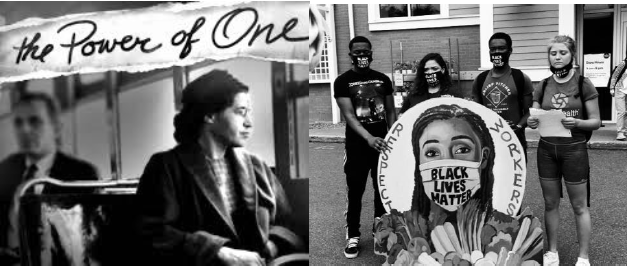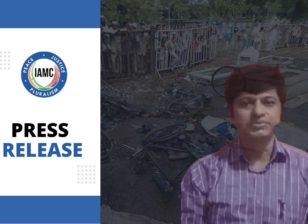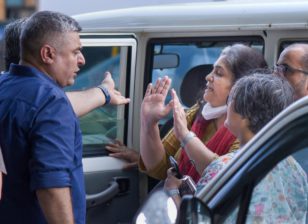Essay and Art Contest on Civil and Human Rights
CONTEST DETAILS
Topic: Civil Rights, Black Lives, and Your South Asian Identity
Open to South Asian-American Students in Grades 6-12

Deadline: The contest closes at Noon EST February 28, 2021
Word Limit for the Essay: 700 to 1000 words
Choose your own title for the essay
Prizes: Winner(s) $1,000; Runner(s)-up $500
Certificates and other prizes for participants
Pre-register today at: https://tinyurl.com/y2mgngf6
Submit your entries at: https://tinyurl.com/y4fl7rce
To hear civil rights pioneers and Black Lives activists, and to witness the virtual Selma March and ‘Bloody Sunday’ commemoration, register free here: http://www.selmajubilee.com/
Hindus for Human Rights (HfHR) and Indian American Muslim Council (IAMC) are organizing an Essay and Art Contest for South Asian-American* students in Grades 6-12 to connect their identities with the historical and contemporary movements for civil and human rights.
(* We welcome submissions from those who identify as bi-racial, transcultural, or whose identities intersect in meaningful ways with Afghanistan, Bangladesh, Bhutan, India, Nepal, Pakistan, or Sri Lanka, and the United States. South Asian students in grades 6 -12 living outside the United States are also welcome if they feel connected to or inspired by the U.S. civil rights struggle and the contemporary Black Lives movements.)
The purpose of the essay is to promote dialogue within the South Asian-American community about how much they have benefited from the civil rights and voting rights struggles of the 60’s. And about how they can contribute meaningfully to the ongoing quest for social justice in America andelsewhere.
In either an essay or a work of art, express how your identity informs your understanding of andresponse to the struggle for civil and human rights. How do you benefit from the efforts of those whofight for such rights? What does non-violence as a core principle of such struggles mean to you? Social,cultural, economic, political, and religious perspectives are all welcome.
Approaches might include (but not limited to): How do the Civil Rights Act of 1964 and the VotingRights Act of 1965 relate to your experience as a South Asian-American today? How does your culturalor religious upbringing affect your engagement with the challenges of our present moment for socialjustice and human dignity? What are your moral obligations in the face of these challenges? Howdoes your identity intersect or conflict with contemporary civil and human rights issues: e.g., antiblackracism and the Black Lives movements, casteism, Islamophobia, LGBTQ+ communities/genderinjustice, gun violence, economic disparities, etc.?
Contest Rules and Details:
SPONSORS:
Hindus for Human Rights (HfHR) is a US based advocacy organization dedicated to working for religious and human rights in India, the US, and other South Asian countries, especially in the context of minority communities (see www.hindusforhumanrights.org).
Indian American Muslim Council (IAMC) is an advocacy group committed to safeguarding
India’s pluralist and tolerant ethos (see www.IAMC.com).
WHAT: Essay/Art contest on how your identity connects with the struggle for civil and human rights.
WHO: The contest is open to South Asian-American* students in Grades 6 through 12, of all faithsand traditions, residing in the United States.
CONNECTING WITH THE SELMA JUBILEE: This contest is timed to coincide with the 56th anniversarycommemoration of Bloody Sunday, which brought about the Voting Rights Act of 1965. We urge allcontestants to pre-register for the virtual event March 5-7th for a unique opportunity to listen tocivil rights stalwarts then and now: http://www.selmajubilee.com/
ESSAY FORMAT:
• 700 words minimum; 1,000 words maximum
• Microsoft Word (.docx) document; double-spaced, 12 pt. Times New Roman font
• No Personal identification information may be in the body of the essay
• Citations, if any, must be placed in the end, and will not be part of the word count
ARTWORK FORMAT: 8 ½ x 11 inch or 11 x 17 inch format
• A high-resolution photograph of your artwork.
HOW TO SUBMIT YOUR ENTRY:
• Please submit your entry by completing the SUBMISSION FORM at https://tinyurl.com/y4fl7rce
THE PROCESS: Essays will be grouped and judged in two or three age groups, depending upon the number of entries. All artwork entries will be judged together. Jurors will not be able to see the names of contestants.
CRITERIA FOR JUDGING YOUR ESSAY:
• Your understanding of the history of the civil rights struggle
• Your case for connecting the non-violence movements in South Asia and the U.S.
• Originality, clarity, and effectiveness of your message.
• Language (grammar, spelling, and composition)
• Any other criteria that the juror groups may agree upon
THE JURY:
FOR THE ESSAY CONTEST:
Tarunjit Butalia, Research Associate Professor, Department of Civil, Environmental and Geodetic
Engineering, The Ohio State University, OH
Linda Hess, Department of Religious Studies at Stanford University (retired), CA
Balmurli Natrajan, Professor, Department of Community & Social Justice, William Patterson University, NJ.
Anantanand Rambachan, Professor of Religion, Saint Olaf College, MN
Samina Salim, Associate Professor Pharmacology, University of Houston and IAMC volunteer, TX
Sarah Sayeed, Chair & Executive Director, New York City Civic Engagement Commission
Roja Singh, Visiting Asst Professor, St. John Fisher College and Dalit Solidarity Forum, NY
Simran Jeet Singh, Writer, Teacher, Author, Visiting Professor of religion at Union Theological Seminary, NY
Masuda Sultan, Afghan American entrepreneur and international human rights advocate, NY Tazmin H. Uddin, Youth Program Director, Turning Point for Women and Families, NY
FOR THE ART CONTEST:
Salma Arastu, a Bay Area artist whose work aims for a universal and interfaith experience of peace and well-being, largely inspired by Islamic calligraphy and art, CA.
Arathi Menon, Assistant Professor of Art History, Hamilton College (Academic work on Kerala sacred architecture), NY
Yousuf Saeed, Yousuf Saeed is an independent filmmaker, researcher and designer based in India.
Siddhartha V. Shah, Director of Education and Civic Engagement, Curator of South Asian Art, Peabody Essex Museum, MA
Thukral and Tagra, Delhi-based artists whose work regularly deals with social issues in India.
GROUNDS FOR DISQUALIFICATION: Submitting an essay that is not your original work, providing false information, missing the submission deadline, not complying with the submittal format and word count will disqualify your entry.
PERMISSION TO USE YOUR ESSAYS, ARTWORK, NAMES, AND PHOTOGRAPHS: Contestants may be asked to submit a release allowing the sponsors to publish your essay and/or artwork in print publications and on public websites. In addition, you may be asked to authorize use of your photograph in contest-related promotional materials.


